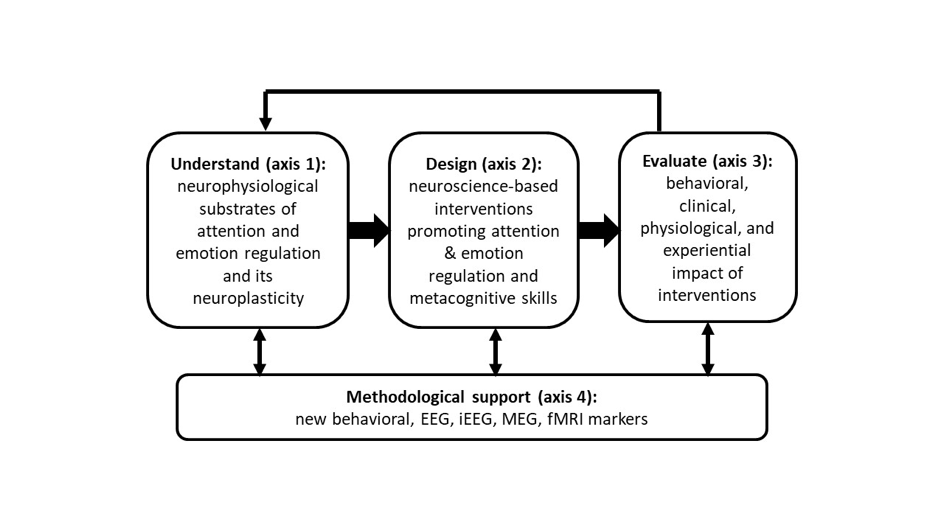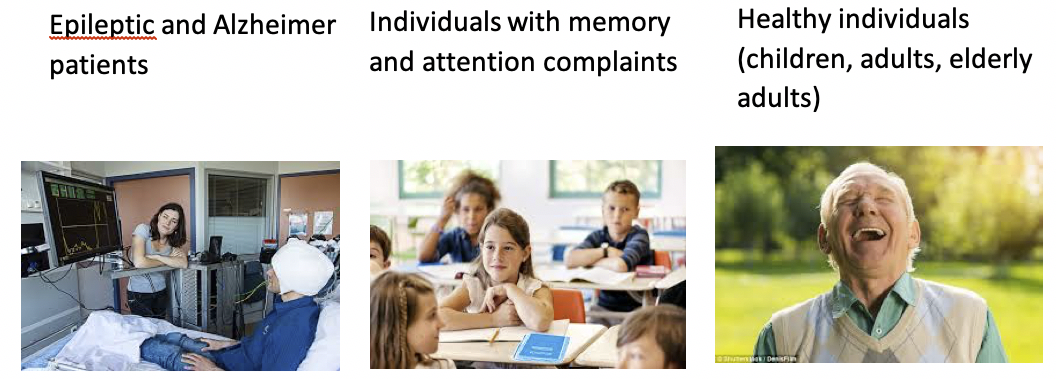The main objectives of EDU-WELL are to pursue fundamental research on the neurophysiological substrates of attention regulation, attention dysregulation and attention-based mental trainings (e. g. meditation), and to characterize the impact of these regulatory processes on well-being, and mental and physical health to propose new clinical and educational tools for diagnosis, prognosis, and neuroscience-informed rehabilitation and prevention.

This research is structured by four research axes (see Figure below). Firstly, it involves a focus on the plasticity of physiological networks associated with attention, emotions, or self-related processes (Axe 1). We investigate those processes using behavioral measures and human neuroimaging invasive and non-invasive techniques (EEG, iEEG, MEG, MEG, fMRI) in healthy individuals (children, adults, elderly adults), and patients (epilepsy, memory disorders) (Axe 4). We are specially interested in the dynamics of the brain networks involved in sensory processing, attention, pain and social cognition with a strong interest in the phenomenological, first-person, and embodied dimensions of those processes. We also explore the neurophysiological characteristics of different states of consciousness in particular during various styles of meditation and hypnosis. In our approach we departed from the traditional dichotomy between a pathological condition and a normal, non problematic condition to rather explore cognition and mental health along a continuum going from dysfunctional condition to optimal well-being condition through ordinary condition. We are designing and scientifically assessing « soft » interventions such educational programs or mental training programs such as mindfulness and compassion meditations with the aim to move participants along this continuum (Axes 2-3). We develop powerful markers of in healthy young and old adults and in patients with epilepsy and attention-deficit. Based on our findings on high-level cognitive processes, we aim at characterizing novel markers of well-being, and of dysfunction in ageing and Alzheimer’s disease, and risk factors and preventive strategies for this disease. Identify psychosocial, medical, pharmacological, biological and neuroimaging factors associated with cognitive, behavioral and functional decline in patients with neurocognitive disorders. The objective is to propose a precise personalized diagnosis, risk factors and preventive strategies, in order to propose personalized care to patients.

The team is organized in three subgroups led by three permanent researchers: LACHAUX Jean-Philippe (Research director, INSERM, HDR), LUTZ Antoine (Research director, INSERM, HDR), and PRADO Jérôme (Researcher, CNRS, HDR). There are currently about 6 Phd students, and two post-doctoral fellows as well as several Master students. The methodological axis is organized by BOUET Romain (permanent Research Engineer, CNRS) as well as 4 engineers. The clinical and educational axis include Pr. ARZIMANOGLOU Alexis (Clinician, HCL), HERBILLON Vania (Clinician Psychologist, HCL), JUNG Julien (Clinician, HCL), Pr. KROLAK-SALMON Pierre (Univ-Hospital Prof, UCBL1-HCL, HDR) as FORT Mathilde (Univ Asst Prof, UCBL1).
- Electrophysiology,(EEG, iEEG, MEG), neuroimaging (fMRI), neurology, clinical neuroscience
- Pioneering role in the study of human cognition from human intracerebral EEG signals.
- Unique iEEG database in the world - active member of the HBP project.
- Expertise in the neurophysiological and clinical study of meditation internally recognized.
- Neurocomputational approach to meditation
- Cognitive and affective neuroscience.
- Attention in “ecological” conditions.
- Spatial attention and math learning.
- Neurophysiology of meditation practices (ERC Consolidator grant, 2014-2021, PI Lutz, A.)
- Impact of meditation training on ageing and well-being (H2020, 2015-2021, Meditageing, WP, Lutz, A. )
- Clinical Research: Intervening at an early stage.
- Effect of interictal activity on attention in epilepsy
- Early diagnosis of emotion regulation and cognitive dysfunctions and personalized interventions in epilepsy and Alzheimer patients.
- Progress in presurgical mapping in epilepsy
- Progress in Human Intracranial electrophysiology.











